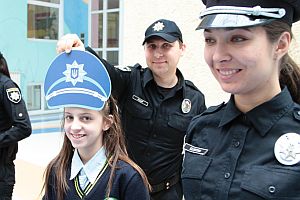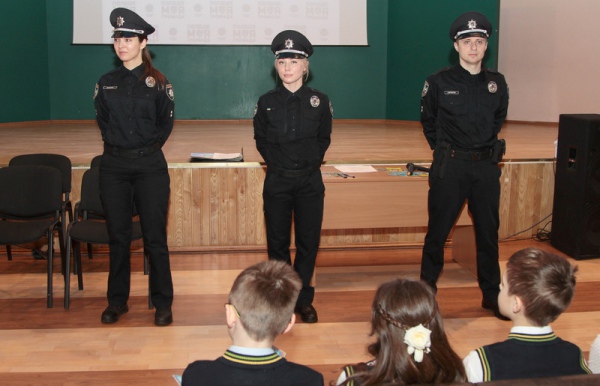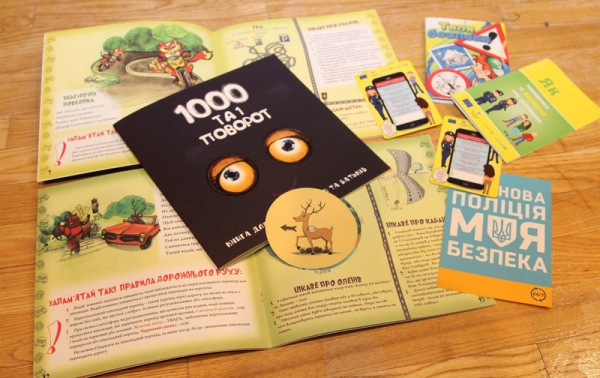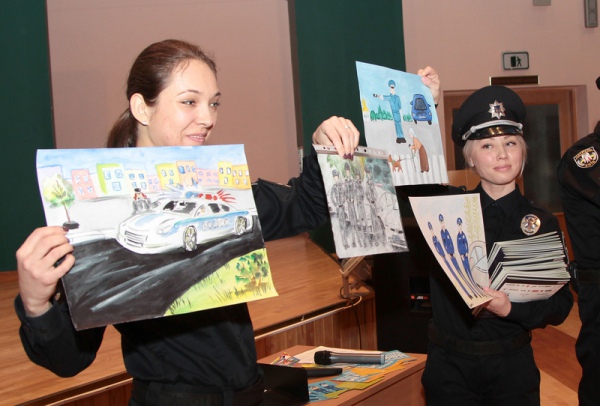03/01/2016 - Olga Klinova, specially for UP.Life . Photos provided by the Ministry of Internal Affairs' Communications Department. The Ministry of Internal Affairs, together with educators, launched interactive lessons from the patrol police. - Please don't tell your children that we will come and take them to prison if they misbehave. We
want them to run to the police when they are scared, not be afraid of them . We know how to be closer, - this is how the founders of the project explain their goal.
WHAT IS SAFETY? A white Toyota patrol police car is parked near Kyiv school No. 78. Here, the "cops" will hold the first open lesson for third-graders. It is quiet in the school hall. Two policewomen and several high school students are "patroling" the territory. Three teachers are whispering in front of the assembly hall. A few minutes later, Deputy Minister of Internal Affairs Eka Zguladze arrives. The official is wearing a black trouser suit. Eka enters the hall accompanied by Oleksandr Fatsevich. For several months now, this military man has been working as Deputy Head of the National Police Khatiya Dekanoidze.
“I wish you health!” three patrol officers greet the leadership. Smiling Eka shakes everyone’s hands. The assembly hall becomes noisy. The seats in the front rows are occupied by third-graders.
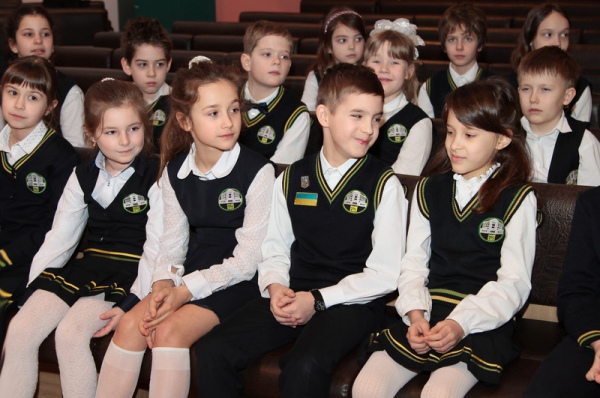 |
| The first rows were given to third graders |
– I really like the new police! They have a nice uniform! – children in vests and sweaters with the school emblem discuss the invited “teachers”.
– There are two third grades here, – says the school principal Svitlana Leontiivna.
– We have four parallels in total, but we deliberately brought fewer children so that the policemen would be more comfortable working . The patrolmen start the lesson with the question:
“What is security?”. Several hands go up in the hall.
– It’s when nothing threatens you, – the girl answers in a thin but confident voice.
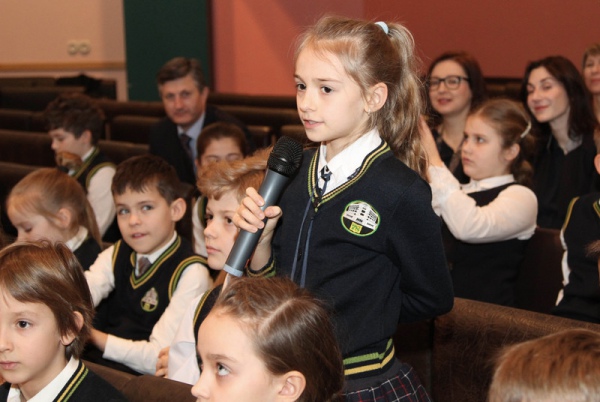 |
| The children actively answered questions and asked their own |
The open lesson was dedicated to road safety. In total, the program part on this topic includes six lessons for schoolchildren of different ages.
WHAT WILL THEY TALK ABOUT The police officers collaborated on the lesson program together with educators , UNICEF, OSCE, the US Embassy, the La Strada Ukraine Information and Consulting Center, the Canadian RSCU project, the EU Advisory Mission, the All-Ukrainian Public Center "Volunteer" and traffic safety activists. The methodology was developed by
Vision Zero for Ukraine activist Viktor Zagreba. Having learned about the interactive lesson program, he offered the Ministry of Internal Affairs his help and later joined the expert group. The developers used the experience of the
THINK state road safety program launched in the UK.
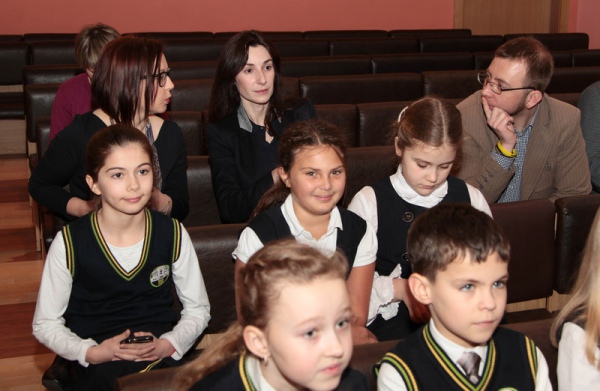 |
| Deputy Minister of Internal Affairs Eka Zguladze and activist Viktor Zagreba sat behind |
– I studied this topic abroad, – says Zagreba.
– Britain is one of the best countries in the world in terms of traffic safety. In terms of content, these lessons are not someone's personal opinion or intuition of some expert, but truly proven world practices. However , all this will not work if there is no understanding from the parents . Experts, police officers, teachers can talk for as long as they like about how important it is to wear a seat belt, not to be distracted while driving, but if the parents of these children do not follow the basic rules and do not have an understanding of safety, then our work will be in vain. In lessons for the youngest schoolchildren, they will tell how
to behave with strangers , what to do
if you are lost or find yourself in a dangerous situation. They will teach
traffic rules, behavior in transport and public places . They will talk with students in grades 6-11
about rights and their protection, responsibility for offenses and Internet safety . They will explain how to behave
if detained by the police . They will also
prevent runaways from home and prevent
drug use and domestic violence. Teenagers will be taught
bicycle safety rules, first aid, basic self-defense and prevention of bullying (psychological terror, beatings and bullying by peers, - ed.).
1001 TURN During the open lesson, third-graders are not shy about asking the police questions:
– How many criminals have you caught? – What rules are violated most often? – Why do you have to pass a trolleybus from the front, and a bus from the back? – Who are more police officers: girls or boys? – Isn’t it hard to work at night? – Why do you need a badge? – And who breaks the rules more often: men or women? – a schoolgirl interrupts the laughter of adults.
– As a girl, I will answer that women are more disciplined, – says patrolwoman Kateryna Belugina.
– Who agrees with me? Mostly girls raise their hands.
– She has a cheat sheet, – smiles Eka Zguladze. A third-grader in the row in front of the deputy minister, clutching a piece of paper with a question in her hands.
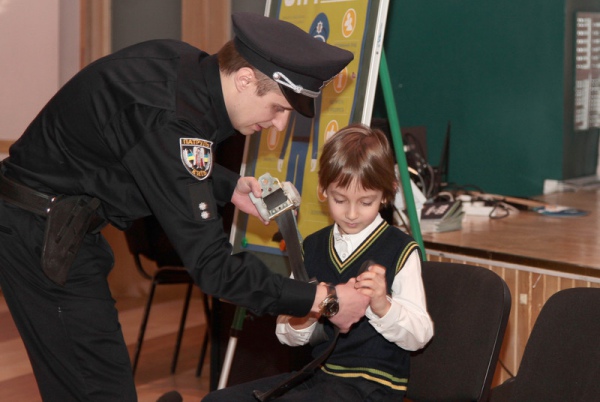 |
| Patrol officers taught schoolchildren to use seat belts |
– Children are delighted with such classes. They just wish they didn’t have to sit in the usual lessons, – says class teacher Natalya Volodymyrivna.
– However, it is very useful . Even when I teach them the rules of the road with an interactive board, it doesn’t make the same impression as meeting with real police officers. They are in uniform and conduct practical exercises. How would we teach them to use a seat belt? And the patrolmen bring equipment with them. It’s something new, fresh. We conduct similar lessons with a firefighter. The lesson ends with gifts. The patrol officers give out books with the rules of the road "1000 and 1 turn" to the children.
- We want to give you drawings from the students of our school, - a businesslike
boy hands the police a plump folder.
- And we want to wish you happiness, health, success in work and fewer violators! 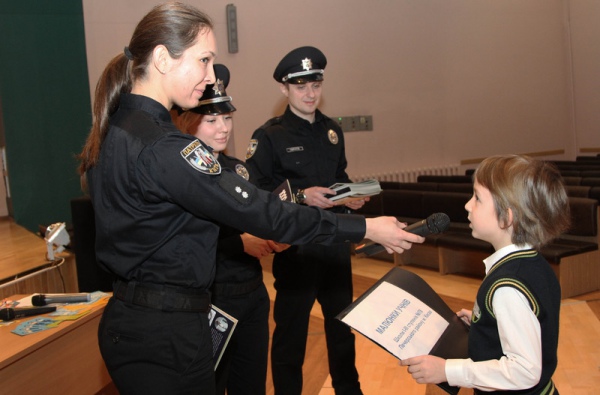 |
| The boy handed the police a loose folder of drawings |
Schoolchildren do not miss the opportunity to take selfies with patrol officers. In turn, police officers take pictures with Zguladze.
- Some girl personally gave it to me, - the patrol officer is embarrassed. Yuriy holds a children's painting on canvas in his hands. The police girls show bracelets woven from yellow and blue rubber bands:
- Every time after school lessons, we bring something with us. And then everyone argues about who will hang which drawing next to them. VOLUNTEERING FOR THE FUTURE Police officers volunteer to conduct classes in schools.
In each district of Kyiv, 3-5 school officers will eventually work . The Ministry of Internal Affairs seeks to make
interactive lessons in schools part of the work of the patrol police . Police officers will conduct training not only in classrooms, but also in the fresh air. Children will have joint football and basketball games with police officers, meetings in libraries, competitions, and the program "Become a Police Officer for a Day."
– I want to become a cop. I had a dream that I was kidnapped by a bandit. And a policeman saved me ,
– says 9-year-old Lyubomyr after the open lesson.
– I also want to be a doctor, a soldier or a football player. Within two months, interactive lessons will be launched in all cities where there is a patrol police. In addition to the capital, classes are already taking place in Lviv, Kharkiv and Dnipropetrovsk.
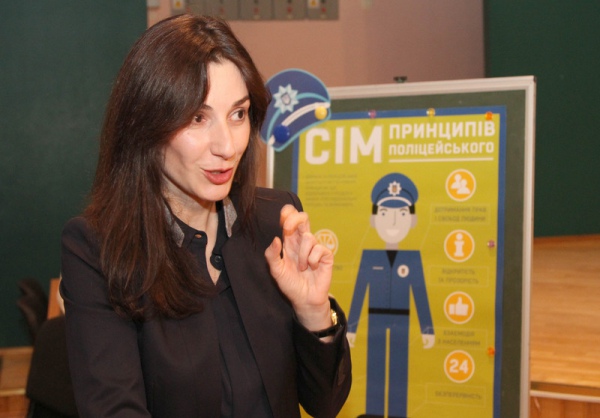 |
| Deputy Minister of Internal Affairs Eka Zguladze |
– If we don’t explain basic things to children, we won’t solve, for example, the problem of parking in Kyiv, – says Eka Zguladze
. – This is long-term work that affects general ethics and culture . As a result, we get a safe city. Children will remind their parents of traffic rules better than patrol officers, not to mention more serious things. Working for adults through children is also a good idea. To have such classes held at the school where your children study,
send a request to the city’s Patrol Police Department .
